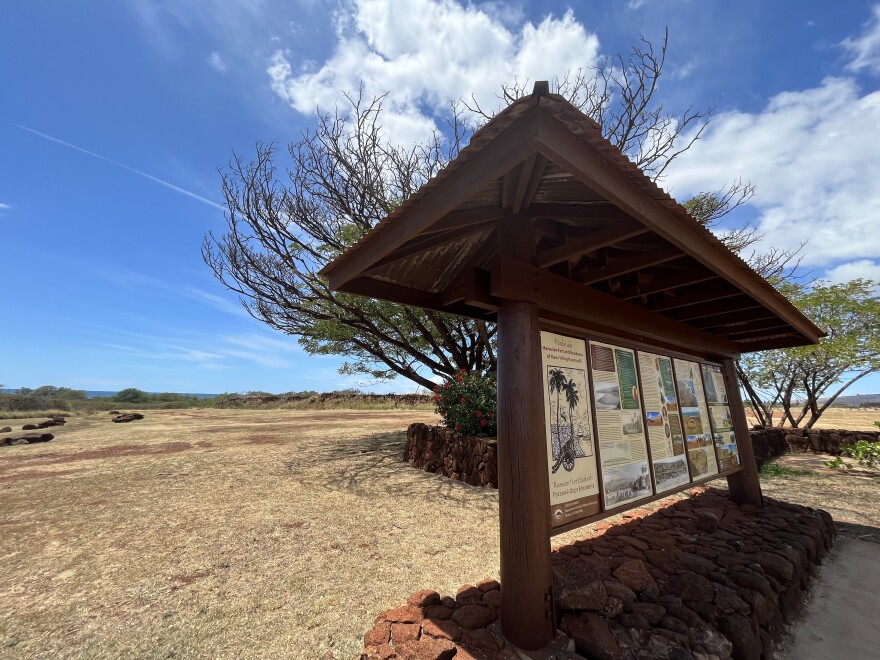Hawaiʻi lawmakers have advanced a resolution urging the state to give a Hawaiian name to the Russian Fort Elizabeth State Historical Park in Waimea, Kauaʻi.
Senate Concurrent Resolution 119 asks the Board of Land and Natural Resources to rename the park to Pāʻulaʻula, the traditional name given to the fort by the Native Hawaiians who built it.

Hanapēpē native Malia Nobriga-Oliveira says growing up on the west side of Kauaʻi, she’d often pass Russian Fort Elizabeth on her way to and from school in Waimea.
"Kēlā me kēia lā kaʻalo ana nā ʻōpio nā ʻohana i kēia wahi akā ʻaʻohe o ko mākou hoihoi i ke kū ma ʻaneʻi. ‘Ike ‘ia ka hōʻailona o Russian Fort Elizabeth akā ʻaʻohe o mākou hoihoi no ka mea ʻaʻole i ʻike ʻia ka moʻolelo o kēia wahi."
But Nobriga-Oliveira says she never felt inclined to visit the park. She would see the Russian Fort Elizabeth sign but she knew little about that history and didn’t feel a strong connection to it.
For Russian-American Natalie Sabelnik, the experience of stumbling upon the early 19th-century fort while on vacation back in 1994 was quite the opposite.
"We did not know there was a Russian Fort Elizabeth there and we went and visited it. It was as it had been for many years before and after pretty run down. I very emotionally connected to Kaua’i because of Russian Fort Elizabeth. So I was really surprised when you sent me that legislation that seemed like it would eliminate Fort Elizabeth altogether," Sabelnik told Hawaiʻi Public Radio.

The legislative action urges the state to change the name to Pāʻulaʻula. That is the earliest written name for this fort, according to University of Hawaiʻi Hilo anthropology professor Peter Mills.
"The name Pāʻulaʻula shows up in written form during the Mahele testimony. There were Hawaiian soldiers stationed at the fort, who were stationed there for more than 40 years, who used that name for the fort. We have no record of it being referred to as Fort Elizabeth or Russian Fort by Kaumualiʻi or any of the soldiers being stationed there in the following decades," Mills said.
Sabelnik says she’s not opposed to the Hawaiian name but asks why the fort can’t have both.
"I absolutely support adding the Hawaiian name to it. It was sacred ground and it is important to honor that part of history, very important since there was more of that than the Russian part of history, but Russian history cannot be erased," she said.

State Rep. Dee Morikawa of Kauaʻi, who introduced the House version of this resolution, says that’s not an option.
"I think community now with whatʻs going on in Ukraine more so sympathize with Ukrainians and are very troubled about whatʻs going on in Russia and I think that more so just makes it like this is the time to do it," Morikawa said.
As for Nobriga-Oliveira, she says the process of renaming the park has sparked a growing interest among locals to dig into the Hawaiian history of this area to uncover the stories of Hawaiian chiefs like Kaumualiʻi, which serve to strengthen the connection kamaʻāina have to this place.
"Kēia manawa ke ulu nei ka hoi i loko nō o mākou nā kamaʻāina o kēia wahi, ke aʻo i kēia moʻolelo a kona pilina i nā aliʻi e like me Kaumualiʻi."
SCR 119 is set for a hearing before the House Committee on Water and Land on Thursday, April 14 at 8:30 a.m.




